I used to hate zonkers; those pre cut rabbit strips were like hell to tie with: too thick skin, too long hair, too wide strips. I stopped tying them until someone told me how to cut my own strips.

I used to hate zonkers; those pre cut rabbit strips were like hell to tie with: too thick skin, too long hair, too wide strips. I stopped tying them until someone told me how to cut my own strips. So now I cut real zonker strips, that can be used for small hook sizes and made from any kind of fur. And zonkers are really great flies; imitative with lots of key characters especially profile and movement.
| Hook | Straight eye streamer 6 or 10 |
| Thread | Tan, black or grey |
| Tail | Tip of zonker strip |
| Body | Flat silver tinsel |
| Rib | Oval silver tinsel |
| Wing | Narrow zonker strip, cut from tanned squirrel, natural gray |
| Hackle | Squirrel fur spun in thread loop |
| Head | Tying thread |
- Start by tying in the ribbing at the hook bend.
- Let the ribbing pass under the hook to one eye width behind the eye
- Cover the ribbing and hook shaft with an even layer of thread
- Tie in silver tinsel where the tied in rib ends
- Turn the tinsel the the bend of the hook and back again to form en even layer
- Tie down tinsel and cut of excess
- Prepare a narrow (2-3 mm) zonker strip
- Tie in strip just behind hook eye with hair direction towards the anterior of the hook
- Pull tight the back end og the strip, and secure with first turn of ribbing
- Turn ribbing in open turns
- Tie down ribbing just behind hook eye (for further details see this article on tinsel bodies)
- Prepare a thread loop for spinning a hackle
- Separate loop and wax one thread
- Let a small tuft of loose squirrel hair stick to wax and get caught between tha threads
- Spin thread with a hackle plier or dubbing twister
- Turn 'hackle' 2-3 times round hook shank just behind eye while stroking back hairs
- Tie down 'hackle' and cut.
- Finish off fly and varnish
- Log in to post comments

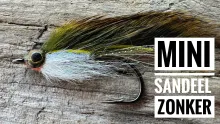
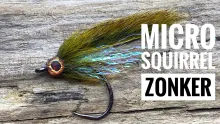
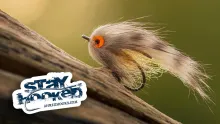
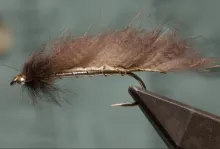
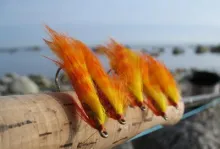
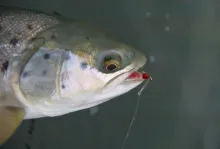

A tool
Here's a youtube video I found for making zonker strip cutters out of double edge razor blades and nuts, bolts and washers.
I cut the strips as
I cut the strips as the method above but use two blades taped to a wood batten, the thickness of the batten being whatever width you want your strip to end up.It gives you a nice even strip the same width all the way along.
Ditto to your method
Ditto to your method Martin. 20 years ago in a junk store I found a large box full of mink, fox, kangaroo and squirrel offcuts. Trial and error led me to cutting 200mm long zonker strips down to 1mm in width with new razor blades. I have been doing it exactly as you say, stretching the pelt in the air, hairside down, and leaving an uncut border at each side for support. No mess and no wastage at all. I still have enough zonker strips to stock a tackle store. Looking forward to the article.
Cheers, Dave Cook
Jarvis,
Another G
Jarvis,
Another GFF visitor asked the same question recently, and this was my reply:
You cannot cut the skin on a surface, but have to cut it while it's stretched but still unsupported.
I actually just pinch one edge on the skin in my vise, fur down, hairs pointing towards myself. I then grab the opposite edge and tighten the skin towards me. I then cut by hand with a fresh old fashioned razor blade. A blade will cut two or three cuts before its too dull, and counting the four corners on a blade, I can cut about 10-12 strips before a blade is too dull. I move the skin a bit in the vise jaws for each couple of strips to get a straight, stretched line to follow with the blade. The sharpness is important because a sharp blade cuts straight while a dull blade will search toward the edge of the strip you're cutting. It requires a little practice, but isn't that difficult.
I never wind up with any loose hair, and even though my strips might be a bit uneven, I can get them as I want them and from any type of skin I have. The best part of most skins is the center part, and I never cut all the way to the edges, but leave half an inch or so in each end. That will make it easier to cut new strips from the same skin, but also leaves you with plenty of "skin frames" - rims left over from the skins you can cut out for strips... ;-)
Hope this helps you.
PS: I may extend this reply intro into a small article with pictures. Thanks for the push!
Martin
Hello to Martin Joer
Hello to Martin Joergensen from Blake Jarvis in British Columbia, Canada.
You talk about cutting your own zonker strips but I can not find anywhere on your site where you tell how to do it properly. I have tried it but always make a hell of a mess. Can't cut the strips evenly. It has got the best of me. I'm an old time fisherman and fly tier. I started at 15 and am now 65.
Could you give me some help please.
Thank you
Blake Jarvis
The Global Fly Fisher is a fabulous site.